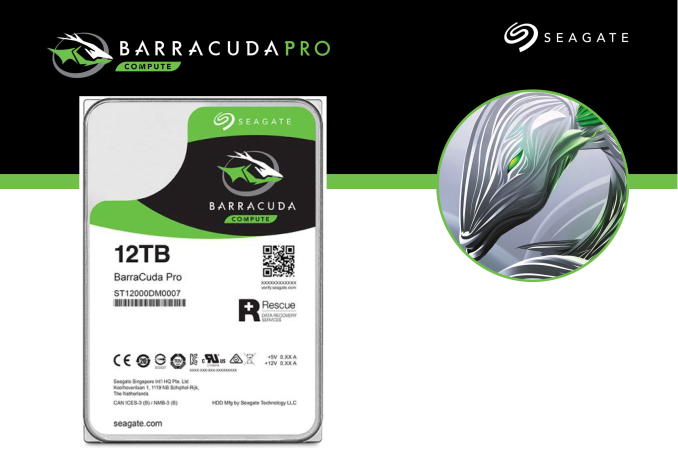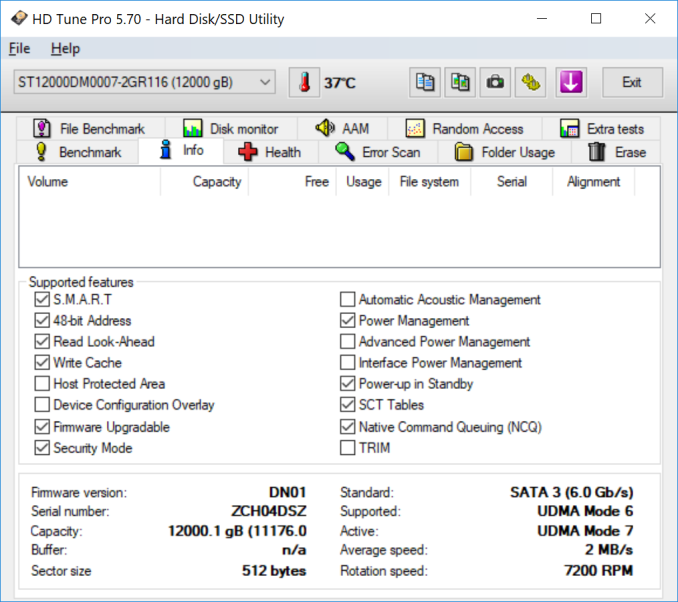Seagate BarraCuda Pro 12TB HDD Review
by Ganesh T S on November 15, 2017 8:00 AM EST- Posted in
- Storage
- Seagate
- HDDs
- Helium HDD

Data storage requirements have seen an exponential increase over the last several years. Both cloud and local storage requirements continue to be served by hard drives where workloads are either largely sequential or not performance sensitive. While the advancements in storage capacity have primarily served the interests of datacenters (enabling more storage capacity per rack), the products have trickled down to consumers in the form of drives for NAS (network-attached storage) units and pre-installed in external / DAS (direct-attached storage) enclosures. Seagate is the only one of the three hard drive vendors to target the desktop storage market with their highest capacity drives. We looked at the 10TB BarraCuda Pro drive last year, and the 12TB follow-up was launched last month.
Introduction
The Seagate BarraCuda Pro 12TB is a 7200RPM SATAIII (6 Gbps) hard drive with a 256MB multi-segmented DRAM cache. It features eight PMR platters with a 923 Gb/in2 areal density in a sealed enclosure filled with helium. According to Seagate, it typically draws around 7.8W, making it one of the most power efficient high-capacity 3.5" hard drives in the market. It targets creative professionals with high-performance desktops, home servers and/or direct-attached storage units. It is meant for 24x7 usage (unlike traditional desktop-class hard drives) and carries a workload rating of 300TB/year, backed by a 5-year warranty. It also comes with a bundled data-recovery service (available for 2 years from date of purchase). The various aspects of the drive are summarized in the table below.
| Seagate BarraCuda Pro 12TB Specifications | |
| Model Number | ST12000DM0007 |
| Interface | SATA 6 Gbps |
| Sector Size / AF | 4096 |
| Rotational Speed | 7200 RPM |
| Cache | 256 MB (Multi-segmented) |
| Rated Load / Unload Cycles | 300 K |
| Non-Recoverable Read Errors / Bits Read | < 1 in 1015 |
| MTBF | 1M hours |
| Rated Workload | ~ 300 TB/yr |
| Operating Temperature Range | 0 to 60 C |
| Physical Parameters | 14.7 x 10.19 x 2.61 cm; 705 g |
| Warranty | 5 years |
| Street Price (in USD, as-on-date) | $500 |
Note that the weight has increased compared to the 10TB drive introduced last year. While the 10TB version had seven platters, the 12TB one bumps it up to eight.
A high-level overview of the various supported SATA features is provided by HD Tune Pro, and shows support for common mechanical features such as NCQ.
The main focus of our evaluation is the performance of the HDD as an internal disk drive in a PC. The other suggested use-case for the BarraCuda Pro is in direct-attached storage devices. The evaluation in these two modes was done with the help of our direct-attached storage testbed.
The internal drive scenario was tested by connecting the drive to one of the SATA ports off the PCH, while the Akitio Thunder3 Duo Pro was used for evaluating the performance in a DAS. The Thunder3 Duo Pro was connected to one of our testbed's Thunderbolt 3 Type-C port. The controller itself connects to the Z170 PCH via a PCIe 3.0 x4 link.
| AnandTech DAS Testbed Configuration | |
| Motherboard | GIGABYTE Z170X-UD5 TH ATX |
| CPU | Intel Core i5-6600K |
| Memory | G.Skill Ripjaws 4 F4-2133C15-8GRR 32 GB ( 4x 8GB) DDR4-2133 @ 15-15-15-35 |
| OS Drive | Samsung SM951 MZVPV256 NVMe 256 GB |
| SATA Devices | Corsair Neutron XT SSD 480 GB Intel SSD 730 Series 480 GB |
| Add-on Card | None |
| Chassis | Cooler Master HAF XB EVO |
| PSU | Cooler Master V750 750 W |
| OS | Windows 10 Pro x64 |
| Thanks to Cooler Master, GIGABYTE, G.Skill and Intel for the build components | |
The full details of the reasoning behind choosing the above build components can be found here.











62 Comments
View All Comments
HStewart - Thursday, November 16, 2017 - link
Large amount of storage can be used for storage of logs and such especially when you have multiple locations. Of course you could have backupjameskatt - Sunday, November 19, 2017 - link
That is why you get three backups and an online backup.Arbie - Wednesday, November 15, 2017 - link
[Sorry, my question was for Ganesh, not the troll thread]I suppose it can be sussed out of the performance data, but... can you please say if this drive is shingle technology or not? With any Seagate drive that's one of my first questions, and they seem to have stopped identifying it in the literature.
ganeshts - Wednesday, November 15, 2017 - link
Oh, I covered that in the launch article, which is linked in the first paragraph.These are standard PMR drives, helium-ones with 8 platters.
XZerg - Wednesday, November 15, 2017 - link
I would suggest to include whether the drive is PMR, Shingled, ... storage in the table as both technologies co-exist but have different purpose/performance.Taracta - Wednesday, November 15, 2017 - link
Hello, the HD Tune random access are both Read not Read and Write. Please correct. Thank you.ganeshts - Wednesday, November 15, 2017 - link
My apologies! It has been fixed now.takeshi7 - Wednesday, November 15, 2017 - link
I really can't stand when people ask if a drive is SMR or "PMR". Every modern hard drive is PMR regardless of whether they are shingled or not. The proper term for a non-SMR drive is CMR.SMR - Shingled Magnetic Recording
CMR - Conventional Magnetic Recording
ganeshts - Wednesday, November 15, 2017 - link
That is a peeve I wouldn't object to, but, let us be honest - everyone treats SMR as the 'evolutionary update' to traditional PMR (CMR) drives. But, I appreciate this insight and will probably use it myself in future articles :)phoenix_rizzen - Wednesday, November 15, 2017 - link
To be pedantic, wouldn't SPMR and CPMR be more accurate?Shingled Perpendicular Magnetic Recording
Conventional Perpendicular Magnetic Recording